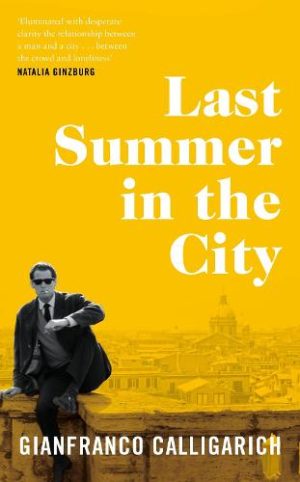Leo Gazzara is hovering on the brink of both turning thirty and plunging into an existential crisis. Keen to avoid respectability, his days are spent avoiding hard work, his nights indulging in the hedonistic thrills of city life. Originally published in 1970, Last Summer in the City by Gianfranco Calligarich is an Italian cult classic. Here translated into English for the first time, it captures those heady days when Rome was the capital of glamour. A boozy, smoky and intoxicating novel, it tells the story of the year Leo’s dolce vita turned sour.
Milanese by birth, in adulthood Leo is drawn to Rome, in part because he feels an affinity with the sea and Rome is close to the Mediterranean. This affinity, alluded to at the beginning of the story will accrue an unbearable poignancy by the end.
Keen too on escaping his family and their expectations, Leo is repelled by the idea of a conventional life. He likes hanging out with his intellectual friends, carousing and waking up in strange beds, having ‘always been lucky with the girls.’ Sporadic work as a hack magazine writer leaves him permanently low in funds but Leo remains expectant.
‘I decided to wait for something to happen. Like an aristocrat under siege.’
That something turns out to be an intimate soirée and the introduction of Arianna, raven-haired temptress and smoker of strong French cigarettes. At the end of the party, they hook up in a scene wonderfully redolent of its time. As the record turntable spins above a pile of empty glasses and overflowing ashtrays, Ariana agrees to drive him home. Glancing at her car back seat, Leo spies ‘a few cheap cigarettes, a copy of Swann’s Way, and a bottle of French perfume.’ His heart is captured.
Their ensuing destructive love affair plays out against the backdrop of a sultry Roman summer, Arianna often hovering on the edge of a nervous breakdown, Leo drifting into melancholy and alcoholism. Despite his avowed aversion to convention, Leo is discovering that a life of hedonism does not necessarily provide sustenance for the soul.
Last Summer in the City offers a literary snapshot of a generation intent on escaping the wartime woes of their parents’ experience. It is wonderfully evocative (top marks to translator Howard Curtis, entrusted with conveying the essence of that singularly seductive chapter in Italian cultural history).
In an undeniably cinematic novel, Arianna is a somewhat tiresome character, a cliché of every kooky indie film female you’ve ever encountered. But forgive that because Rome is the real star of the show. I loved Calligarich’s evocation of summer evenings glittering with lights, ‘café tablecloths ruffled by the wind, like girls’ skirts.’
Behind the dazzling white steps and fountains, intoxicating Rome offers no half measures. ‘She’s either the love of your life or you have to leave her,’ and as the suffocating month of August arrives, Leo comes to a decision.
An essential read for Italian literature completists.
Last Summer in the City by Gianfranco Calligarich is translated by Howard Curtis and published by Picador, 192 pages.





